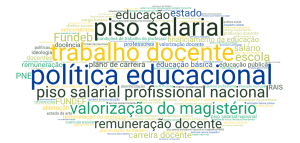ORIGINAL ARTICLE
FERREIRA, Ricardo Batista [1], FECURY, Amanda Alves [2], OLIVEIRA, Euzébio de [3], DENDASCK, Carla Viana [4], DIAS, Claudio Alberto Gellis de Mattos [5]
FERREIRA, Ricardo Batista. Et al. Socio-emotional skills in publications in education in the last five years: a brief review. Revista Científica Multidisciplinar Núcleo do Conhecimento. Year. 07, Ed. 01, Vol. 04, pp. 131-145. January 2022. ISSN: 2448-0959, Access link: https://www.nucleodoconhecimento.com.br/education/socio-emotional, DOI: 10.32749/nucleodoconhecimento.com.br/education/socio-emotional
SUMMARY
The concept of competence is composed of our rational and emotional actions influenced by sociocultural factors. Competence combined with the control of emotions in social situations facilitates the resolution of conflicts. The objective of this work was to make a bibliographic review on emotional competencies in education present in publications in the last five years. The method used was a brief literature review on socio-emotional competencies in publications on education between 2017 and 2021, in Portuguese, in Google Scholar search databases. It is necessary to identify which competencies are needed and which can be developed in the school environment. Educational policies seem to require the inclusion of socio-emotional competencies in basic education curricula, but there is a lack of training of teachers. The restructuring of curricula should also cover daily teaching situations that were possible to be carried out, from the reorganization of pedagogical spaces, aligned with teaching strategies based on competencies. The modernization of curricula with the inclusion of socio-emotional competencies provides students with integral (omnilateral) training. In Professional and Technological Education (EPT)[6] technical-professional knowledge should be beyond content training, preparing students to face real situations of the future profession. Adultlife, and life at work, requires behaviors and knowledge that the student will use in his social and professional practice, outside the school environment.
Keywords: Education, Teaching, EPT, Socioemotional Competence.
INTRODUCTION
The concept of competence is broad, multidisciplinary and with several possible meanings. It is composed of our rational and emotional actions influenced by sociocultural factors. It can be learned in many ways, in school environments or not. Competencies change according to society and this influences the professional profiles required by companies and also by the educational area. To be competent is to mobilize resources, behaviors and knowledge and articulate them to chart a safe path in the face of a demand that requires decision-making in coping with problem situations (Perrenoud, 2014; Marinho-Araujo and Rabelo, 2015) (Figure 1).
Figure 1. Shows the phases for the development of competence.
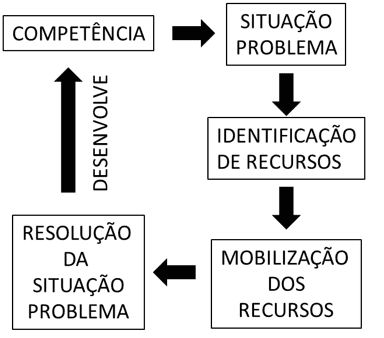
In the animal kingdom, including the human species, the term “social” may mean that there is a rule that dictates the conduct of living beings in their group (Carvalho, 1994). In the group of human beings the concept of “social” indicates that individuals create, learn and follow norms for coexistence (Moraes, 2020).
Emotions can be characterized by a set of circumstances where personal experiences can activate responses, perceptible or not, in the body of the individual. These experiences can occur with the individual himself (his thoughts and how the world affects him); between him and another; and in a social context. Reactions to the experiences that the subject has can lead to different behaviors, such as facing an adverse situation; deviate or run away from it; making decisions based on learning from previous situations; recognize emotions of others by facial and body expression. Emotions are considered beneficial when they help in decision making, helping to achieve goals, and motivating socially accepted behaviors. They can be considered harmful when their frequency exceeds limits in decision-making leading to negative behavior and non-fulfillment of a desired goal (Morais, 2019).
Socio-emotional competence is a characteristic of individuals who have comparatively above-average self-control. Competence combined with the control of emotions in social situations facilitates the resolution of conflicts, personal or interpersonal, in a constructive and creative way. The development of this type of competence contributes to the integral formation of the person (Carvalho and Silva, 2017; Azevedo, 2019; Cericato and Cericato, 2019; Gonçalves, 2019; Silva, 2019).
The demands of modern society require a new professional profile that is able to meet the complexities of social problems. In view of this scenario, education begins to consider not only the cognitive aspects of the student, but also the emotional and social characteristics, including new knowledge to face the challenges, which involve not only intellectual education, but integral education (Carneiro and Lopes, 2020; Silva, 2020; Barreto, 2021).
The development of socio-emotional skills in the school allows the student to exercise autonomy and responsibility for their attitudes, and contributes to the preservation of their mental health. Thus, developing socio-emotional skills at school contributes to a preventive attitude, avoiding situations of bullying, anxiety, depression and other types of disorders. By developing these competencies, students start to have greater empathy with others, respecting individualities, personal limits and improving the quality of current and future relationships (Carneiro and Lopes, 2020; Silva, 2020). Including in their curriculum educational strategies for the development of socio-emotional skills, educational institutions contribute to the human and integral formation of the student, allowing him to be able to overcome and solve complex problems and have a successful professional life (Silva, 2020; Barreto, 2021).
The Federal Constitution of 1988 ensures that the offer of Education in Brazil is everyone’s right and aims to ensure the full development of the person and prepare for the exercise of citizenship and qualification for work (Brasil, 2019). The National Education Guidelines and Framework Law (LDB)[7], which arises as a result of the Federal Constitution of 1988, states that the provision of school education must be related to the world of work and social practice (Brasil, 1996).
The General National Curriculum Guidelines for Professional and Technological Education (EPT)[6], depending on the resolutions of the LDB[7], adapted their curricula to monitor the changes that occurred in the socio-occupational training of work and the requirements of professional training at different levels of development, aiming at the construction of technical-professional skills. Therefore, EPT[6] should consider work as an educational principle, integrating cognitive and socio-emotional knowledge in its curricular organization, aiming to develop professional competencies that guarantee the full development of the subject, preparing for the exercise of citizenship and its training for the world of work (Brasil, 2021).
Socio-emotional competencies are defined in § 2 of article Art. 20 of the General National Curriculum Guidelines for EPT[6] as:
(…) parte integrante das competências requeridas pelo perfil profissional de conclusão podem ser entendidas como um conjunto de estratégias ou ações que potencializam não só o autoconhecimento, mas também a comunicação efetiva e o relacionamento interpessoal, sendo que entre estas estratégias destacam-se a assertividade, a regulação emocional e a resolução de problemas, constituindo-se como competências que promovem a otimização da interação que o indivíduo estabelece com os outros ou com o meio em geral. (Brasil, 2021. p, 8).
According to BNCC[8], competencies should also be incorporated into basic education, ensuring the right to essential learning, focusing on the development of integral student education.
Na BNCC, competência é definida como a mobilização de conhecimentos (conceitos e procedimentos), habilidades (práticas, cognitivas e socioemocionais), atitudes e valores para resolver demandas complexas da vida cotidiana, do pleno exercício da cidadania e do mundo do trabalho (Brasil, 2017), p. 9).
The EPT[6] must, in its technical courses of high school in the integrated and concomitant forms, follow the provisions referring to the National Common Curricular Base (BNCC) of high school, guaranteeing students development and knowledge evidenced in cognitive, professional, socio-emotional practices, values and emotions, integrated in professional competencies (Brasil, 2021).
GOAL
Make a bibliographic review on emotional skills in education present in publications in the last five years.
METHOD
A brief literature review was conducted on socio-emotional competencies in publications on education between 2017 and 2021, in Portuguese, in Google Scholar search databases . The keywords (or descriptors) “Socio-emotional skills and education”, “Socio-emotional skills and teaching”, and “Socio-emotional skills and professional education” were used. This allows the review to be made based on the most up-to-date academic productions (Capes, 2012).
RESULTS
Table 1 shows the number of articles found per descriptor surveyed and the number of articles used in the review. It also shows the authors and years of the publications used.
Table 1 – Number of articles found and used, according to each descriptor, and their respective authors and years.
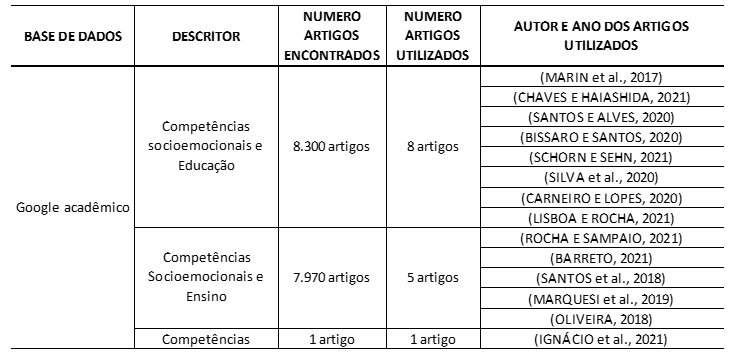
The results and conclusions of the articles on the descriptor “socio-emotional competencies and education” with method, author and year of each article are shown in table 2.
Table 2 – Results and conclusions of articles on the descriptor “socio-emotional competencies and education” with method, author and year of each article.
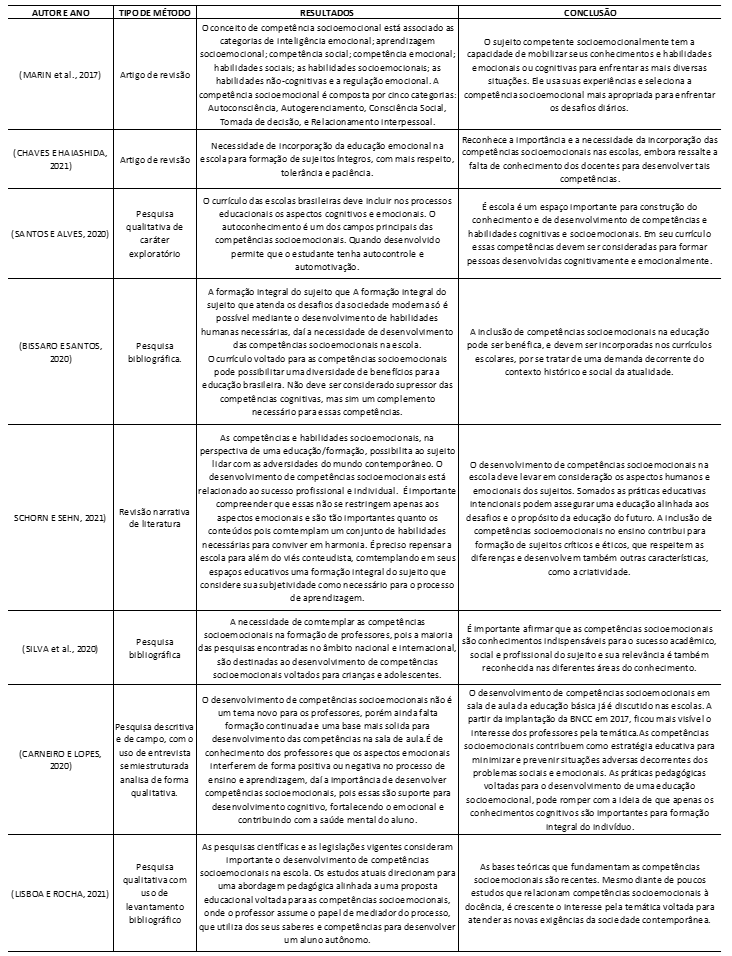
The articles on the descriptor “socio-emotional competencies and teaching”, their results and conclusions, their methods, authors and years are in table 3.
Table 3 – Results and conclusions of the articles on the descriptor “socio-emotional competencies and teaching” with method, author and year of each article.
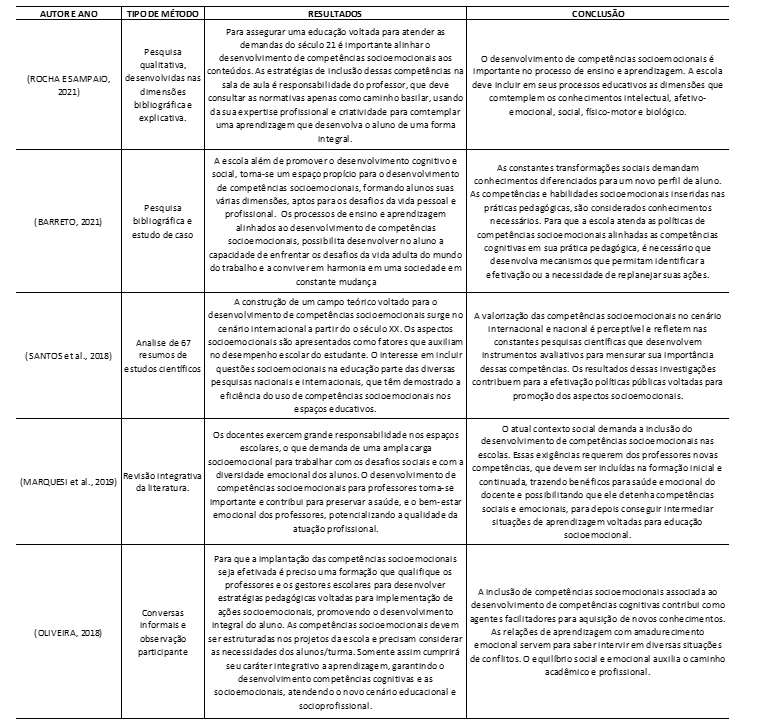
Table 4 shows the results and conclusions of the articles on the descriptor “socio-emotional competencies and professional education” with method, author and year of each article.
Table 4 – Results and conclusions of the articles on the descriptor “socio-emotional competencies and professional education” with method, author and year of each article.

DISCUSSION
Changes in the social context require the formation of a new profile of students with diverse skills to face the complex social, political, economic and cultural transformations of the 21st century. These new competencies should be part of the formative itineraries of basic education, in order to ensure an integral development of the student based on cognitive and socio-emotional skills, following the recommendations of the 1996 LDB[7] and the 2017 National Common Curricular Base (Pereira and Nascimento, 2021).
The school is an important and fundamental space for the construction of knowledge and development of cognitive and socio-emotional skills (Santos and Alves, 2020; Chaves and Haiashida, 2021). These new demands in the educational field require the development of competencies aligned with cognitive and emotional knowledge that, in addition to educational practices, can contribute to the integral formation of the subject (Schorn and Sehn, 2021).
The educational institution should not scoff from its commitment to content teaching, but also cannot deny its social commitment, which is to contribute to the improvement of society and its subjects (Silva and Ferreira, 2020). It is important in the incorporation of socio-emotional competencies, as these enable the formation of critical and ethical subjects, who respect differences and also develop other characteristics, such as autonomy and creativity (Schorn and Sehn, 2021).
It is then necessary to incorporate socio-emotional skills in educational institutions, making adjustments in their school curricula (Santos and Alves, 2020; Silva and Ferreira, 2020; Chaves and Haiashida, 2021; Pereira and Nascimento, 2021; Schorn and Sehn, 2021). The school training itinerary should not only have the function of developing learning based on cognitive skills, but rather the purpose of an integral education, contemplating in their curricula the development of social and emotional skills (Ribeiro et al., 2020). Thus, there is a need to incorporate in them an education with pedagogical practices and actions that contemplate the intellectual and socio-emotional dimensions, such as necessary knowledge for the integral formation of the student (Carneiro and Lopes, 2020; Santos and Alves, 2020; Barreto, 2021; Rocha and Sampaio, 2021).
The incorporation of socio-emotional competencies is a demand resulting from the current historical and social context (Bissaro and Santos, 2020). They should be part of the curricula of all basic education, as they are legally considered as an integral part of the curricula of Brazilian schools since 2020 (Ribeiro et al., 2020). The school will be able to meet the policies of inclusion of competencies when developing mechanisms that allow identifying its effectiveness, prioritizing its objectives and aligning its actions for the development of cognitive and socio-emotional skills (Barreto, 2021).
The policy of inclusion of skills in schools points to the need for continued training of teachers. From the appropriation of this knowledge is that they will understand the importance of socio-emotional competencies and their benefits. These go beyond the limits of schools, contributing to the personal and professional life of the student (Lucena et al., 2021). The lack of teaching knowledge becomes a challenge in the attempt to develop the socio-emotional skills in its students (Chaves and Haiashida, 2021). Before developing them in the students, it is necessary to unite the teacher with competencies and strategies that allow not only to implement socio-emotional competencies, but that this is a work consistent with the objectives and endowed with intentionality (Resende, 2020).
With the implementation of the BNCC[8] in 2017, the interest of teachers in knowledge focused on theme was visible (Carneiro and Lopes, 2020), even in the face of the scarcity of studies that relate socio-emotional skills to teaching, there is growing interest in the theme aimed at meeting the new demands of contemporary society (Lisboa and Rocha, 2021). These new requirements require new competencies from teachers, which should be included in initial and continuing education, bringing benefits to the emotional health of teachers. This enables him to have social and emotional skills, and then to be able to mediate learning situations aimed at socio-emotional education before his students (Marquesi et al., 2019).
Resolution CNE/CP 02/2019 for the initial training of teachers of Basic Education and Common National Basis for the Initial Training of Teachers of Basic Education (BNC-Training)[9], describes that the
“[…] conhecimento pedagógico sobre a relação entre docente e alunos e o processo de ensino e aprendizagem, que, colocados em prática, favorecem o desenvolvimento integrado de competências cognitivas e socioemocionais (Brasil, 2019a)”.
This means that teachers must be able to know broadly the socio-emotional skills to be able to use them, together with formal knowledge, in the classroom (Brasil, 2019a).
A research on the importance of developing socio-emotional skills in the classroom, conducted with 12 teachers of basic education, showed that the socio-emotional dimensions of students influence positively or negatively in their learning process. This alerts to the importance of developing the student in its cognitive and emotional aspects (Carneiro and Lopes, 2020).
Learning relationships with emotional maturation serve to know how to intervene in various situations of conflicts. Social and emotional balance helps the academic and professional path (Oliveira, 2018). Socio-emotional skills are indispensable knowledge for the success of the subject and its relevance is also recognized in different areas of knowledge (Silva et al., 2020).
A student who has his socio-emotional skills developed has greater ease in learning formal school content (Oliveira, 2019). It is usually able to develop healthy relationships at school and in other social contexts, avoiding aggressive and conflicting behaviors (Silva and Ferreira, 2020). The socio-emotional development in the school, integrated with content knowledge, enables an integral formation, positively influencing the current and future relationships of the student (Carneiro and Lopes, 2020).
The discussion about the implementation of socio-emotional competencies in education for integral education of the subject is found in the basic documents of education, evidencing that in addition to the full development of the person and must ensure an education for the exercise of citizenship and qualification for work (Brasil, 1996; 2019).
In Professional and Technological Education (EPT)[6] some Pedagogical Political Projects (PPPs) include problem solving for both teachers and students. Teachers should take into account, in the planning and execution of pedagogical practices, the resolution of problems (Alves and Kaiser, 2020).
The EPT[6] professor has different and often diverse training stems from the undergraduate area. Moving around the non-academic world they often bring in the practice of problem solving and have greater social interaction. Allied to this fact, stricto sensu training, constant in the EPT[6] career, enables the use of knowledge generated in research to increase problem solving (Neto, 2020).
It is expected that, thus, the students taught by them apply formal knowledge, make responsible decisions and solve day-to-day problems (Alves and Kaiser, 2020). Different methodologies used promote learning and make ptsd students think in a community and autonomous way, which facilitates coping with real problems (Seibel, 2020).
A project developed in an EPT[6] educational institution, in the area of physical education, contributed to the development of socio-emotional skills in technical high school students. The students reported, at the end of the experience, that, despite the existing competition, cooperation between teams predominated. Self-control, autonomy, self-esteem and independence were the goals achieved in this project. EPT[6] educational institutions seem to be a propitious place for the development of these competencies (Viana et al., 2020).
The comprehensive and omnilateral training that guides the federal institutes of vocational and technological education, allows students to have an experience in internships much superior to students of the same level in regular education. This experience of working in companies increases the student’s socio-emotional repertoire. The internship introduces him not only to the concept of work, but also to social and educational coexistence, and problems that must be solved (Costa, 2020).
CONCLUSIONS
Theories about the implementation of socio-emotional competencies in education seem to indicate objectives, but there is an absence of concrete proposals that can be implemented or gradually implemented. It is necessary to identify which competencies are needed and which can be developed in the school environment. This would allow quantifying and qualifying their contribution to the social and emotional development of teachers and students.
Although educational legislation presents the need to include socio-emotional competencies, they do not present a reasoned basis or how they should be organized. Educational policies seem to require the inclusion of socio-emotional competencies in basic education curricula, but there is a lack of training of teachers. They are the main agents in the direct training of students in the classroom.
The restructuring of curricula should also cover daily teaching situations that were possible to be carried out, from the reorganization of pedagogical spaces, aligned with teaching strategies based on competencies.
The modernization of curricula with the inclusion of socio-emotional competencies provides students with integral (omnilateral) training. This training contributes to formal learning in the classroom and, going beyond, is able to positively influence your professional performance as an adult.
In Professional and Technological Education (EPT)[6] technical-professional knowledge should be beyond content training, preparing students to face real situations of the future profession and to overcome challenges and problems. This requires a formation that contemplates the social and emotional dimensions (socio-emotional competencies).
Conducting more research on the inclusion of socio-emotional skills in teaching environments is important. Educational actions usually start from outside this environment. Adultlife, and life at work, requires behaviors and knowledge that the student will use in his social and professional practice, outside the school environment. And that the teacher will use to conduct their students in a full learning.
REFERENCES
ALVES, L. A.; KAISER, J. P. S. Letramento científico na EPT: o que nos diz o projeto pol´ítico pedagógico do IFRN. Labor, v. 1, n. 24, p. 11-23, 2020.
AZEVEDO, V. C. F. D. Competências Socioemocionais De Gestores De Escolas Públicas. 2019. 34p. (Graduação). Universidade Federal da Paraíba, João Pessoa PB.
BARRETO, D. D. M. Desenvolvimento de competências socioemocionais: desafios em uma escola técnica. ECCOM, v. 12, n. 23, p. 263-272, 2021. Disponível em: < http://publicacoes.unifatea.edu.br/index.php/ECCOM/article/view/1284/1173 >.
BISSARO, D. Z.; SANTOS, D. Z. Educação do campo: um estudo em defesa de um currículo voltado para as competências socioemocionais. Kiri-kerê: Pesquisa em Ensino, v. 2, n. 4, p. 101-119, 2020.
BRASIL. LEI Nº 9.394, DE 20 DE DEZEMBRO DE 1996 – Estabelece as diretrizes e bases da educação nacional. Brasilia DF: Casa_Civil 1996.
______. Base Nacional Comum Curricular (BNCC). Brasilia DF: MEC 2017.
______. Constituição da República Federativa do Brasil. Brasilia DF: STF: 577 p. 2019.
______. Diretrizes Curriculares Nacionais para a Formação Inicial de Professores para a Educação Básica e BaseNacional Comum para a Formação Inicial de Professores da Educação Básica (BNC-Formação). Brasilia DF, 2019a. Disponível em: < http://portal.mec.gov.br/index.php?option=com_docman&view=download&alias=133091-pcp022-19-3&category_slug=dezembro-2019-pdf&Itemid=30192 >. Acesso em: 30 nov 2021.
______. Resolução nº 1 de 05 de janeiro de 2021. Diretrizes Curriculares Nacionais Gerais para a Educação Profissional e Tecnológica. Brasilia DF: CNE 2021.
CAPES. Treinamento no uso do Portal de Periódicos. Brasilia DF, 2012. Disponível em: < https://www.fca.unesp.br/Home/Biblioteca/portal-capes.pdf >. Acesso em: 06 set 2021.
CARNEIRO, M. D. L.; LOPES, C. A. N. Desenvolvimento das Competências Socioemocionais em Sala de Aula. Revista multidisciplinar e de psicologia, v. 154, n. 53, p. 1-14, 2020.
CARVALHO, A. M. A. O que é “social” para a psicologia? Temas em Psicologia, n. 3, p. 1-17, 1994.
CARVALHO, R. S.; SILVA, R. R. D. Currículos socioemocionais, habilidades do século XXI e o investimento econômico na educação: As novas políticas curriculares em exame. Educar em Revista, n. 63, p. 173-190, 2017.
CERICATO, I. L.; CERICATO, L. Competências Socioemocionais de Bolso: formando alunos e professores para os desafios do séc. XXI. 1. São Paulo SP: Editora do Brasil, 2019. 66p.
CHAVES, C. M.; HAIASHIDA, K. A. Abordagem das competências socioemocionais no ensino remoto. Ensino em Perspectivas, v. 2, n. 3, p. 1-10, 2021.
COSTA, R. A. P. Estágio na educação profissional técnica de nível médio: A formação no mundo do trabalho 2020. 180p. (Mestrado). Universidade Federal da Bahia, Salvador BA.
GONÇALVES, G. P. Implementação da política de desenvolvimento das competências socioemocionais: Um estudo de caso na EEFM João Mattos. 2019. 107 (Mestrado Profissional ). Universidade Estadual Do Ceará, Fortaleza CE.
IGNÁCIO, F.; RAMIREZ, R. A.; BERGAMO, R. O. C. Competências socioemocionais e educação profissional: práticas docentes em ensino remoto. Revista Interdisciplinar em Educação e Territorialidade – RIET, v. 2, n. 2, p. 246 – 263, 2021.
LISBOA, A. C.; ROCHA, P. A. M. Competências socioemocionais e docência: a BNCC e as novas exigências na formação de professores. In: CASTRO, P. A. D. (Ed.). Educação como (re)Existência: mudanças, conscientização e conhecimento. Campina grande: Ralize Editora, v.1, 2021. p.1-26.
LUCENA, V.; OLIVEIRA, S.; MANFRÉ, A. H. As competências socioemocionais e o processo de ensino e de aprendizagem escolar. ENEPE. Presidente Prudente SP: 2339-2353 p. 2021.
MARIN, A. H. et al. Competência socioemocional: conceitos e instrumentos associados. Revista Brasileira de Terapias Cognitivas, v. 13, n. 2, p. 92-103, 2017.
MARINHO-ARAUJO, C. M.; RABELO, M. L. Avaliação educacional: a abordagem por competências. Avaliação: Revista da Avaliação da Educação Superior, v. 20, n. 2, p. 443-466, 2015.
MARQUESI, A. M.; HIROMI, T. L.; FÓZ, A. Q. B. Avaliação de programas de intervenção para a aprendizagem socioemocional do professor: Uma revisão integrativa. Revista Portuguesa de Educação, v. 32, n. 1, p. 35-51, 2019.
MORAES, P. E. H. Currículo formal e informal e situações interpessoais como condições que afetam a autoavaliação sobre habilidades sociais e competência social de estudantes de Psicologia. 2020. (Mestrado). Universidade Federal de São Carlos, São Carlos SP.
MORAIS, F. A. D. Emoções no Contexto da Educação Profissional e Tecnológica: contribuições para a compreensão do trabalho emocional docente. 2019. 66p. (Doutorado). Universidade Federal da Bahia, Salvador BA.
NETO, A. F. D. S. A Formação Continuada De Professores Da Educação Profissional E Tecnológica (EPT) Brasileira. 2020. 91p. (Mestrado). UNIJUÍ, Ijuí RS.
OLIVEIRA, M. E. As Competências Socioemocionais, Formação Cidadã e Projeto de Vida: um diálogo possível no chão da escola. Campina Grande PB, 2018. Disponível em: < https://editorarealize.com.br/artigo/visualizar/46422 >. Acesso em: 02 dez 2021.
OLIVEIRA, M. E. Os desafios da implementação das Competências Socioemocionais na sala de aula. VI CONEDU. Fortaleza CE: 1-12 p. 2019.
PEREIRA, W. C.; NASCIMENTO, F. D. C. B. Nível das competências socioemocionais de alunos do ensino médio no contexto da pandemia de covid 19. Revista Docentes, v. 6, n. 15, p. 11-19, 2021.
PERRENOUD, P. 10 novas competências para ensinar : convite à viagem Porto Alegre RS: Artmed, 2014. 192p.
RESENDE, D. M. P. O papel das competências socioemocionais: visão multidisciplinar de agentes educativos. 2020. 42p. (Mestrado). Universidade Católica Portuguesa, Porto PT.
RIBEIRO, C. F. et al. Inteligências e Competências Socioemocionais: o papel das ETECs no desenvolvimento de Soft Skills. XV Simpósio Dos Programas De Mestrado Profissional Unidade De Pós-Graduação, Extensão E Pesquisa. São Paulo SP: Centro Estadual de Educação Tecnológica Paula Souza: 313-322 p. 2020.
ROCHA, M. D. M.; SAMPAIO, M. A. P. A importância do desenvolvimento das competências socioemocionais para a aprendizagem: Uma revisão de literatura. In: GONÇALVES, M. C. D. S. e JESUS, B. G. D. (Ed.). Educação Contemporânea. Belo Horizonte MG: Poisson, v.17, 2021. p.49-58.
SANTOS, G. M. D.; ALVES, J. F. D. S. Competências socioemocionais na escola: tão imprescindíveis quanto os conteúdos e as práticas educativas, um requisito para a formação integral do estudante. In: ANDRADE, D. F. (Ed.). Série Educar – Reflexões. Belo Horizonte MG: Poisson, 2020. cap. 08, p.57 – 63.
SANTOS, M. V. D. et al. Competências Socioemocionais: Análise da Produção Científica Nacional e Internacional. Gerais: Revista Interinstitucional de Psicologia, v. 11, n. 1, p. 04-10, 2018.
SCHORN, S. C.; SEHN, A. S. Competências socioemocionais: Reflexões sobre a educação escolar no contexto da pandemia. Rio Grande do Sul: UNIJUI: 1-16 p. 2021.
SEIBEL, M. K. Ensino Híbrido Na Educação Profissional E Tecnológica Como Possibilidade Didática Na Formação Crítica Do Aluno. 2020. 155p. (Mestrado). Instituto Federal Do Espírito Santo, Vitória ES.
SILVA, A. D. Análise de Competências Socioemocionais de Gestores Escolares na Cidade de Santa Rita – PB. 2019. 37p. (Graduação). Universidade Federal da Paraíba, João Pessoa PB.
SILVA, B. B. D. C.; FERREIRA, M. C. P. L. Educação socioemocional e suas repercussões no contexto escolar. 2020. Disponível em: < http://repositorio.aee.edu.br/jspui/bitstream/aee/17050/1/EDUCA%c3%87%c3%83O%20SOCIOEMOCIONAL%20E%20SUAS%20REPERCUSS%c3%95ES%20NO%20CONTEXTO%20ESCOLAR.pdf >. Acesso em: 05 dez 2021.
SILVA, J. S. D.; SANTOS, I. R. D.; SAMPAIO, M. A. P. Competências socioemocionais: Um mapeamento sistemático de literatura no Estado do Tocantins. Anais VII CONEDU. Maceio AL: Realize Editora 2020.
SILVA, M. M. C. O desenvolvimento de componentes socioemocionais como forma de prevenção ao bullying na escola: uma análise das competências gerais da BNCC. 2020. Universidade Estadual do Rio Grande do Sul, Cruz Alta RS.
VIANA, V. N.; OLIVEIRA, E. D.; DIAS, C. A. G. M. O Papel Da Educação Física Na Ept – De Nilo Peçanha ao Instituto Federal. In: VIANA, V. N. e DIAS, C. A. G. M. (Ed.). Educação física e EPT. São Paulo: Centro de Pesquisa, v.1, 2020. cap. 1, p.07-14.
APPENDIX – FOOTNOTE
[6] Educação profissional e Tecnológica (EPT).
[7] Lei de Diretrizes e Bases da Educação Nacional (LDB).
[8] Base Nacional Comum Curricular (BNCC).
[9] Base Nacional Comum para a Formação Inicial de Professores da Educação Básica (BNC-Formação).
[10] Projetos Políticos Pedagógicos (PPPs).
[1] Pedagogue and Social Communicator, Specialist in Professional Education (FATECH), Neuropsychopedagogy (FACEL), and Management, Guidance and School Supervision (FIAR). Student of the Graduate Program in Professional and Technological Education (PROFEPT IFAP).
[2] Biomedical, PhD in Tropical Diseases, Professor, and researcher of the Medical Course of Macapá Campus, Federal University of Amapá (UNIFAP).
[3] Biologist, PhD in Tropical Diseases, Professor, and researcher of the Physical Education Course of the Federal University of Pará (UFPA).
[4] Theologian, PhD in Clinical Psychoanalysis. He has been working for 15 years with Scientific Methodology (Research Method) in the Scientific Production Guidance of master’s and Doctoral students. Specialist in Market Research and Research focused on health. PhD student in Communication and Semiotics (PUC SP).
[5] Biologist, PhD in Theory and Behavior Research, Professor and researcher of the Chemistry Degree Course of the Institute of Basic, Technical and Technological Education of Amapá (IFAP) and the Graduate Program in Professional and Technological Education (PROFEPT IFAP).
Submitted: January, 2022.
Approved: January, 2022.















